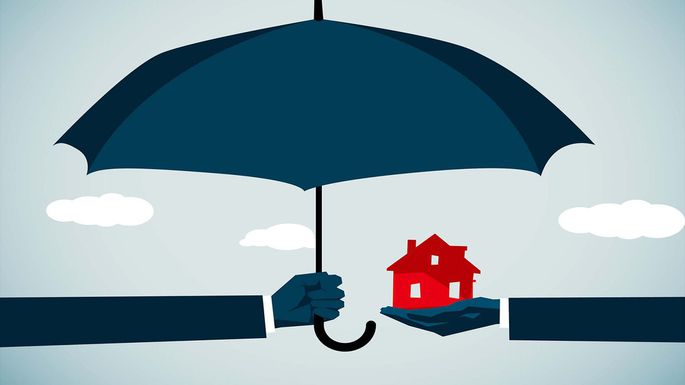How much is homeowners insurance? It’s a question with answers that are going to vary for each homeowner, depending on the size, age, and condition of the home, as well as the deductible and liability coverage. But know this: No matter how safe and secure you feel in your home, it’s a fact of life that bad things can happen at any time—floods, fires, sinkholes, theft. And that’s why buying home insurance is a must. But how much does homeowners insurance cost? The average annual premium runs about $952, but a bunch of unique factors can go into calculating a specific quote, and that information could help you get a lower home insurance rate in some cases. Got it? Let’s look at the things that make a difference in how much you’ll wind up shelling out for home insurance:
How much is homeowners insurance affected by the condition of your home?
Homeowners insurance cost and how a home’s condition affects the rate, liability, and deductible are issues homeowners commonly wonder about.
The condition of a home includes everything from a house’s roof to its pipes, heating system, electrical wiring, and even age.
For instance, the lead and galvanized pipes found in older homes “result in higher premiums as they are more prone to cracks or leaks than the copper and plastic piping used in newer homes,” says Paul Boudreau, an insurance broker at Rowat Insurance.
Price to rebuild per square foot
Since homeowners insurance often offers liability for rebuilding whatever part of your home succumbed to fire, flooding, or other disaster, most home insurance policies factor in the price per square foot to rebuild in your area based on current construction rates.
While the national average is $95.51 per square foot, the overall cost of homeowners insurance policies can differ drastically from insurer to insurer.
It’s important for your insurance company to do a reconstruction cost estimate to ensure “the proper rating for building materials,” says Jason Pesch, owner of a local insurance agency in Scottsdale, AZ.
While most policies include a deductible to pay replacement cost (the cost to rebuild a home), some insurers pay only the depreciated current value for the whole house.
Probability of insurance claims in your area
“If your home is located in an area prone to tornadoes or forest fires, you’re going to have a higher premium due to a greater risk of damage,” says insurance expert Michael Senderovich.
In other words, the more known risk there is to your home, the stiffer the homeowners insurance premium.
For example, the annual cost of insuring a home in Louisiana is $1,722—the nation’s highest due to the claims filed after Hurricane Katrina. (The state with the lowest home insurance price is Idaho, averaging just $534.)
Since every standard homeowners insurance policy excludes coverage for natural disasters like earthquake and flood, be sure to check with your agent to see if you need the extra liability coverage. Note that the cost of those add-ons such as flood insurance could easily exceed the price of your homeowners insurance policy.
Your credit score, age, and other personal info
You—yes, you, the homeowner—also factor into how much homeowners insurance will cost.
According to Erin Wenzel, account manager at Michigan’s Provision Insurance Group, everything from your credit score, marital status, age, level of education attained, and frequency of claims submitted on prior homeowners insurance policies will increase or decrease your rate and deductible. (Hint: A higher credit score and few or no claims usually result in a lower rate for home insurance.)
Whether your home has recreational (and risky) amenities
A home with a swimming pool, trampoline, or certain other “fun” features signals a high-risk situation to a home insurance company—and your price quote, liability coverage, and deductible will reflect that. Same goes for homes with pets or farm animals that could be dangerous (e.g., large dogs or horses). In these cases, policyholders may need to add extra liability.
Increasing home prices
Inflation or the increased value of your home in an upmarket may cause your homeowners insurance premiums to increase each year. Be sure to check with your insurance company about how the market could affect your home insurance.
Safety features in your home
You may be able to snag a homeowners insurance discount if your home has a nifty feature that an insurer may find attractive (e.g., storm shutters, security systems, or carbon monoxide detectors). If your home doesn’t have such features, consider upgrading them for a possible discount and to cut your homeowners insurance expense.
“Installing a security system for $30 per month may reduce your premiums by at least that amount—and provide additional safety for your family at the same time,” says Wes Taft, co-founder of moveCHECK.
How to lower the cost of homeowners insurance
However painfully obvious this advice may seem, you should shop around for homeowners insurance. Many homeowners go with the first homeowners insurance policy quote they get in order to cross one more thing off their list during a move or the home-purchasing process. And it’s a big, costly mistake because you may pay more. But the cheapest home insurance option isn’t always the best, either.
“An informed insurance agent that can shop your home with multiple insurance carriers is your best bet at finding a great rate for your home,” says Wenzel.
Ask the agent to explain why the homeowners insurance premiums are different and what the trade-offs are in liability coverage and deductibles. And this isn’t just something you should do when you first buy a home. Every year, you should review your homeowners insurance, including your liability coverage, premium, and deductible.
“Make an effort to get a new quote each year, and shop around if you’re not happy with your current rate,” Taft says.
Homeowners insurance companies hungry for new business offer competitive rates on premiums.






